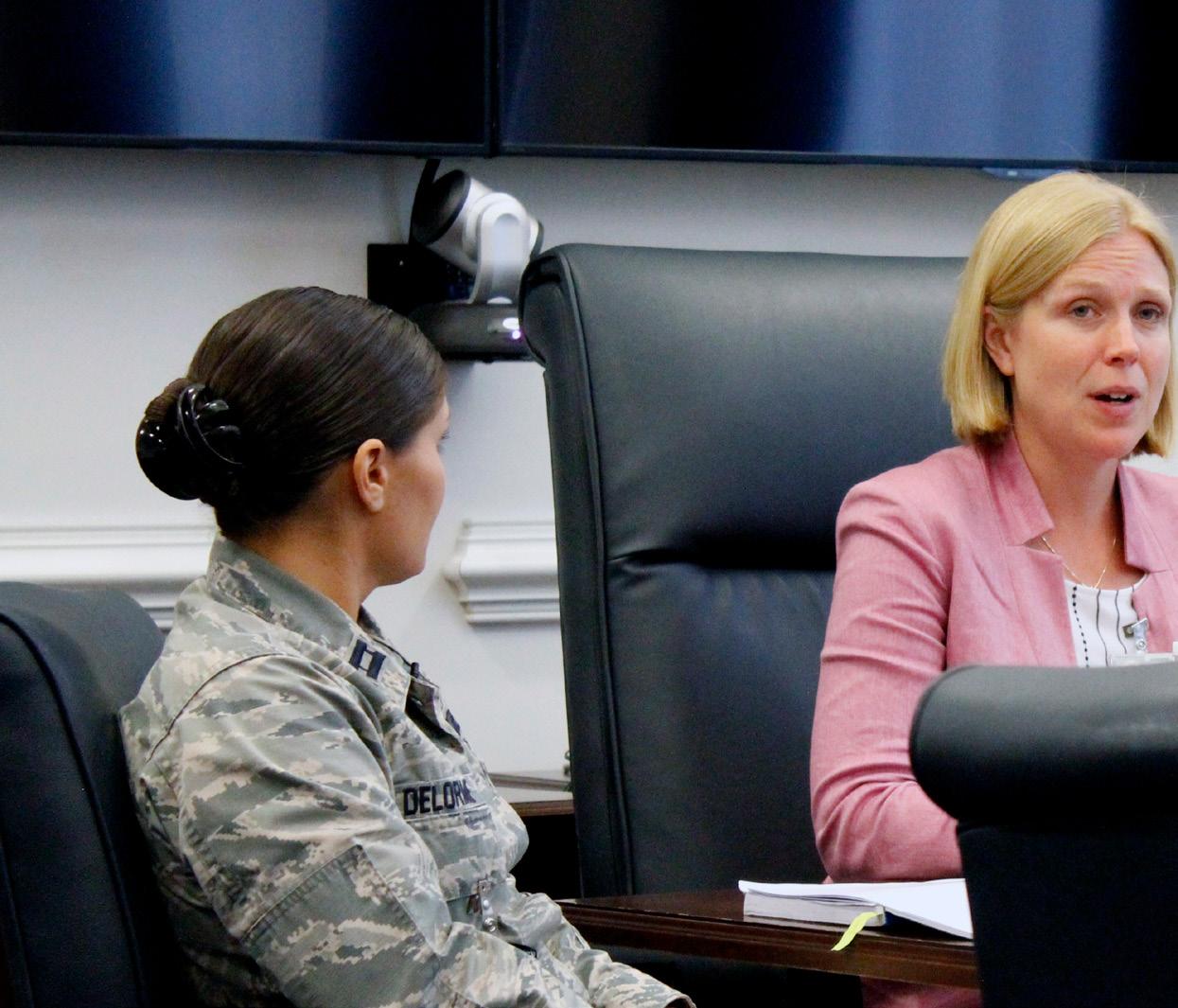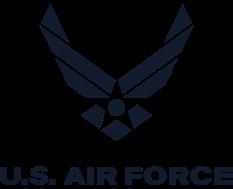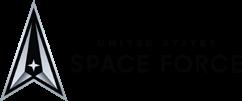DAF CIO Lauren
Knausenberger on the honour of a lifetime







When a high-level official steps down from their position, it often raises questions about the future of the organisation they leave behind. But Lauren Knausenberger, CIO of the Department of the Air Force, will be leaving with her head held high.

Knausenberger’s time in the role which she describes as the “honour of a lifetime” is coming to an end: she leaves her role, on 2nd June. But speaking with her shortly before her time as CIO concludes, it is clear that she is not letting up as she prepares to cross the finish line.
“There are a couple of things that are going to be a photo finish,” she explains. “One is just getting all of our endpoints on the same image and having all of those endpoints remotely managed. We’re pushing very, very hard on that.”
Other projects nearing completion are the simplification of the department’s endpoint security model and the first wave of its Enterprise IT-as-a-Service, which is aimed at improving consistency of IT service delivery.
“Those are all big things that have been in progress for a little while and people are really trying to get it done because we have a shared sense of urgency in the Department. These are the top items on the hit list I want to see done before I leave.”
As her time as CIO at the Department of the Air Force comes to an end, Lauren Knausenberger tells us about the tasks still on her hitlist and her advice for her successor

An experienced technologist who began her career at the NSA as a teenager, since 2021 Knausenberger has held the role of CIO for the Department of the Air Force, comprising the US Air Force and US Space Force.

“I’ve been able to build an incredible team,” she adds. “When I depart, I am not at all worried about walking out the door and knowing that there are a number of people that can pick up the torch and run.”
From notes on a bar napkin to CIO
Before joining the Air Force as its Director of Cyberspace Innovation in 2017, Knausenberger graduated from
“When I depart, I am not at all worried about walking out the door and knowing that there are a number of people that can pick up the torch and run”
LAUREN KNAUSENBERGER CHIEF INFORMATION OFFICER, DEPARTMENT OF THE AIR FORCE
fields
Conference, also
at the Pentagon, July 19. AFCON is a one-day immersion into Air Force technology, culture and operations designed for long-form storytellers who typically do not cover the military.
Wharton Business School and held a number of roles in the entrepreneurial and investment industry.

Most recently working in a high-profile role in the defence sector, the call to serve her country came literally in the form of a call from an Air Force captain who had been inspired by a speech by then-DAF CIO, Lieutenant General Bill Bender.
“My husband got a call from an Air Force captain one day, and he just said, ‘We need more companies like your wife’s company in the defence space. We have so many barriers to innovation. I’d really love to chat with someone like her about how we can solve some of these problems’.”
LAUREN KNAUSENBERGER
TITLE: CHIEF INFORMATION OFFICER
COMPANY: DEPARTMENT OF THE AIR FORCE
LOCATION: WASHINGTON, US
Lauren Barrett Knausenberger is the Chief Information Officer for the Department of the Air Force, comprised of the US Air Force and US Space Force. Ms. Knausenberger leads three directorates – Enterprise Information Technology, Data and Artificial Intelligence and Cybersecurity – and supports 20,000 cyber operations and support personnel around the globe with a portfolio valued at U$17bn. She provides oversight of the Air Force’s Information Technology investment strategy from networks to cloud computing, Enterprise policies, data management, digital transformation, information resources management, information technology innovation initiatives, information assurance and related matters for the Department of the Air Force.
EXECUTIVE BIO
 Image: Lauren Knausenberger (centre), director of Cyberspace Innovation, talks about women in technology career
during the Air Force
known as AFCON,
Image: Lauren Knausenberger (centre), director of Cyberspace Innovation, talks about women in technology career
during the Air Force
known as AFCON,

“It truly has been an honour of a lifetime to work with these airmen and guardians, at a time that we’re launching the Space Force and truly becoming an enterprise and moving through a lot of cultural barriers too”
LAUREN KNAUSENBERGER CHIEF INFORMATION OFFICER, DEPARTMENT OF THE AIR FORCE
The punchline was, ‘Can I take your wife out for a beer?’ Knausenberger laughs.
“After my husband stopped laughing, he sent the captain my phone number and we met up,” she says. “As we were chatting, I opened up my little bar napkin and I started sketching some things out. We were having a great conversation and just bouncing ideas off each other.”
From this conversation, Knausenberger was asked to put those notes together in a pitch to General Kim Crider, who would later become the first Chief Data Officer of the
Air Force and the first Chief Technology and Innovation Officer for the Space Force.

“I then met General Holmes who went on to be the Air Combat Command four-star and then to General Bill Bender where it all started. And, over time, he and General Crider tackled me and said, ‘Hey, we really need you to serve your country because when you talk about these things, we believe that we can really do them’.”
As Knausenberger explains, the CIO role came thanks to the decision by the Air Force to cast a wider net in the interest of innovation.
“The CIO at the time, Bill Marion, looked across the table at me one day and he said, ‘You know you’re probably the next obvious CIO, right?’ And after I looked over my shoulder
at who he could possibly be talking to, I said something along the lines of, ‘I don’t think that is obvious at all!’
“He encouraged me to put my name in the hat. And because the Air Force cast a wider net, I was not a tenured member of the senior executive service at the time.”
Since taking on the role, Knausenberger says it has been an honour to work with her team, particularly at such a transformative time.
“It truly has been an honour of a lifetime to work with these airmen and guardians, at a time that we’re launching the Space Force and truly becoming an enterprise and moving through a lot of cultural barriers too, through

“ I feel that we are very well set up for the next five years to completely crush it as a cyber IT and comm team”
LAUREN KNAUSENBERGER CHIEF INFORMATION OFFICER, DEPARTMENT OF THE AIR FORCE
COVID, to truly understand what a digital world is and that it is the underpinning of our future competitive advantage.”
Walking tall and gaining a seat at the table
The hard work of Knausenberger and her team over the last three years has truly elevated the stature of the office of the CIO. “The CIO 100% has a seat at the table,” she says. “The secretary relies on us for technical guidance. MAJCOM Commanders rely on us to solve major problems for them for the fight.”
As a result, the cyber and IT community feels incredibly valued. “We do lots of things that support air power anytime, anywhere.
DEPARTMENT OF THE AIR FORCE
Image (Left): Lauren Barrett Knausenberger, Chief Information Officer for the Department of the Air Force, participated in a base tour March 29, 2023 at Eielson Air Force Base, Alaska. During her visit, Knausenberger met with Col. David Berkland, 354th Fighter Wing Commander, to learn more about their mission and discuss the critical role of cyber communication. As the Chief Information Officer for the Department of the Air Force, Knausenberger is responsible for overseeing the Air Force’s communication and information technology strategy. This includes ensuring that the Air Force’s cyber capabilities are aligned with the needs of the service and the broader national security goals.
We do lots of things that support the fight in space, but people now recognise very consistently that the airplanes are not taking off without all the IT and cyber systems and personnel that support them.”
One of Knausenberger’s proudest achievements, she says, came when the United States Air Forces in Europe (USAFE) A6 and USAFE MAJCOM commanders were looking for new solutions to problems with their IT infrastructure.

“I went out personally and then put together a broader team across our operational community to go out and work with those guys. In partnership with the MAJCOM commander and A6 out there, we completely overhauled their infrastructure. And so they were able to go through and do these critical exercises with their allies with greater performance and resilience than they had ever seen.”
As Knausenberger explains, this new ability to move quickly has been particularly important in recent times.
“We did not know at the time that the Ukraine conflict would be coming, but when it did, because we had done all of that hard work, it was so much easier to launch new capabilities that would provide that resilience


Image(above): Lauren Barrett Knausenberger, Chief Information Officer for the Department of the Air Force, participated in a base tour March 29, 2023 at Eielson Air Force Base, Alaska. During her visit, Knausenberger met with Col. David Berkland, 354th Fighter Wing Commander, to learn more about Eielson’s mission and discuss the critical role of cyber communication. Knausenberger’s visit provided valuable insights into the base’s use of communication and information technology to help identify areas where additional resources or support may be needed.

that we would need to do anything to help and to be prepared for ourselves in case things got really bad,” she comments. “That’s something I was really proud of.”
Improving user experience
Historically, the US Department of Defense might not have been known for its excellence in IT. But thanks to the efforts of Knausenberger and her team, a marked improvement in user experience has been made.
“Over my first year in the seat, we had about a 12-point improvement,” Knausenberger says. “And then over the user experience numbers I just saw, it looks like we went up another 12 points.
“That’s a 25-point improvement that I can put my finger on through the efforts of the team. The user experience improvement has been huge and I expect that to be even greater
as we’re able to do more with our ICAM roadmap and as we’re able to really gain momentum on EITaaS Wave 1.”
Central to the DAF’s plans going forward is continuity, Knausenberger says, which will enable the department to continue to deliver in the coming years.
“I feel that we are very well set up for the next five years to completely crush it as a cyber IT and comm team. We have the right strategy in place, we have the right roadmaps in place, we have the right teams in place, and we have the right funding and resource profile in place. And I do not

Image(below): Lauren Barrett Knausenberger, Chief Information Officer for the Department of the Air Force, participated in a base tour March 29, 2023 at Eielson Air Force Base, Alaska. During her visit, Knausenberger met with airmen to discuss the future of cyber communication and recognised three outstanding service members. Senior leadership visits like this are important because they give Airmen the opportunity to talk to and share their concerns with key decision makers.

remember a time that we could say that at the same time.
“I feel really comfortable walking out the door knowing that we’re in a good place. I feel good that I’ve been able to make a difference and I know that the team that follows is going to be able to exponentially drive even more as some of those initiatives come to full fruition. So I’m excited to be able to watch the home game and cheer on the sidelines with my popcorn as this team continues to win a few games.”
Lines of Effort shaping CIO’s strategy
Last year, the DAF released its CIO strategy up to 2028, highlighting six Lines of Effort to shape the department’s IT strategy going forward.
Covering topics such as cloud adoption, cybersecurity and AI, these topics were chosen to directly address the needs of the emerging strategic and technological environment in which the department operates.

“The strategy has six lines of effort and it’s not anything too surprising. It might look a lot like what you would find in a commercial CIO strategy,” Knausenberger explains.
Knausenberger, US Air Force Chief Information Officer, greets US Air Force Lt. Col. Adam Williams, 52nd Communications Squadron commander, in front of Club Eifel on Spangdahlem Air Base, Germany, July 21, 2021. Knausenberger visited Spangdahlem AB to discuss the Enterprise IT-asa-Service initiatives, as well as gain firsthand knowledge of 52nd CS cyberspace capabilities and innovations.
The first Line of Effort is around the acceleration of cloud adoption. “We have done a very good job in this area in that we have, I believe, the world’s largest cloud instantiation with over 750,000 users times multiple networks in the cloud, as well as a pretty robust multicloud environment within Cloud One. But we’re still just chipping the surface on that. We have a lot of things that we do need to migrate within the secret and top-secret realm as well.
“We’re making it easier to consume cloud services, we’re being more transparent about the cost of those cloud services and we are removing some of the roadblocks to automate more of the process.”
As Knausenberger explains, the future of cybersecurity plays a major role and is the strategy’s second Line of Effort. “Zero Trust plays a big role here. There’s a lot about workforce education here as well because every person has a responsibility in cyber. And then post-quantum encryption and in general crypto agility also play pretty heavily on the cybersecurity side.”
Image(left): Lauren





